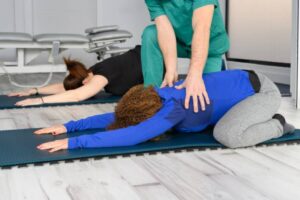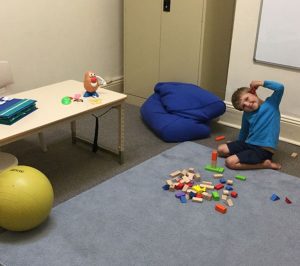Clinical Pilates classes can help anyone recover from injury, care for themselves through pregnancy or optimise performance in sport. Led by experienced Physiotherapists and Exercise physiologists who possess extensive knowledge about anatomy, movement, and injury rehabilitation – clinical Pilates classes provide a solution.
 Teachers in this clinical pilates studio Adelaide keep class sizes small to ensure each participant always receives individual attention and completes each exercise correctly, which many people appreciate. This personalised approach to fitness makes many enjoy this form of Pilates.
Teachers in this clinical pilates studio Adelaide keep class sizes small to ensure each participant always receives individual attention and completes each exercise correctly, which many people appreciate. This personalised approach to fitness makes many enjoy this form of Pilates.
Individualised Workouts
Clinical Pilates offers the ideal way to reach your physical fitness goals, whether that’s recovering from injury, maintaining health during pregnancy, improving strength, balance and movement or anything in between.
Targeting core muscles that may otherwise go unused, this form of exercise targets core muscles often neglected during other workouts to strengthen and stabilise the spine while improving posture, flexibility, and strength. Our physiotherapists work to strengthen these areas to avoid further pain or injury in future.
Clinical Pilates classes are tailored specifically to you and your abilities, with your physiotherapist carefully and slowly leading you through each technique and piece of equipment. This ensures no exercise goes beyond what your body can safely manage – placing wellbeing before exercise! In comparison with larger group Pilates classes where participants may feel left behind or struggle with movements, they cannot yet complete; which can cause discomfort and lead to frustration; small class sizes in Clinical Pilates allow for enhanced observation and guidance.
One-to-One Assessments
Before commencing classes at Clinical Pilates, all new participants undergo an initial assessment with one of our Physiotherapists who will conduct an in-depth medical and injury history review as well as conduct physical assessments to detect weaknesses or areas that require work. With this information in hand, an individualised program can then be created specifically tailored for you.
A physiotherapist in clinical pilates studio Adelaide can assist in the retraining and improvement of core and pelvic stability muscles, posture, and movement patterns. Their comprehensive treatment approach may include manual therapy techniques, tactile cueing, and guided movement for optimal performance in class.
Clinical Pilates classes provided by our physiotherapists and graduate exercise physiologists allow you to claim health fund rebates for each private (1:1) or small group (4 client) session. Please check with your health fund to learn how you can make use of it.
Physiotherapy Guidance
Your physiotherapist will conduct a full assessment, identifying any injuries and creating an individualised program to address them. Sessions can either take place individually or with small groups (typically 3-4) depending on your injury and rehabilitation needs.
A physiotherapist will guide you through each exercise to improve posture, movement control, stability, and flexibility. They’ll monitor your progress closely to reduce risk of aggravating an existing injury.
Clinical Pilates exercises work to strengthen deep postural muscles of your tummy, spine, and hips to increase spinal mobility while simultaneously increasing balance, body awareness and movement quality and control. Their personalised instruction sets it apart from traditional classes where participants usually sit under one instructor. That makes clinical Pilates exercises particularly suitable for injury rehabilitation because not only is their purpose to strengthen muscles; rather they focus on improving how you move and helping restore pain-free living for you and others.
Smaller Classes
Clinical Pilates classes differ from regular group Pilates in that instructors are better able to monitor your technique and ensure every exercise is appropriate for you. This is an essential aspect of successfully doing pilates as getting each movement right requires focused attention, guidance, and concentration in order to avoid injury.
A visit in a clinical pilates studio Adelaide can help if you’re feeling discomfort, taking care during pregnancy, or looking to peak performance during a sport or event. Through one-to-one assessment and personalised sessions tailored just for you and your needs, Clinical Pilates helps build strength and improve movement control faster and better allowing you to reach the results faster and better than before.
Clinical Pilates can be practiced during physiotherapy treatments and/or after finishing therapy as an exercise progression to help avoid re-injury. An assessment must take place prior to enrolling for your first class (and every 12 classes thereafter for health fund claims), to ensure each program is modified or tailored accordingly for you and meets all individual requirements.

 A
A  For example, a therapist can use shockwave therapy, ultrasound machines, or cold laser therapy to heal an injury. These methods can help strengthen and stretch weak muscles. Another option is to take NSAIDs to ease the inflammation caused by injuries.
For example, a therapist can use shockwave therapy, ultrasound machines, or cold laser therapy to heal an injury. These methods can help strengthen and stretch weak muscles. Another option is to take NSAIDs to ease the inflammation caused by injuries. Studies show that children involved in speech therapy are better at recognizing body language, pointing gestures, and answering questions. They also are better at putting sentences together. Parents also need to praise their children a few times a day.
Studies show that children involved in speech therapy are better at recognizing body language, pointing gestures, and answering questions. They also are better at putting sentences together. Parents also need to praise their children a few times a day.